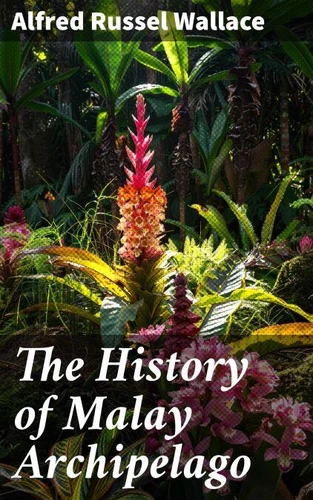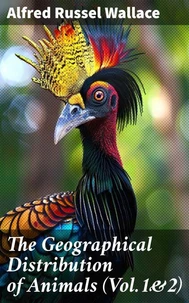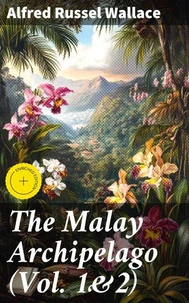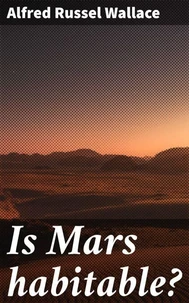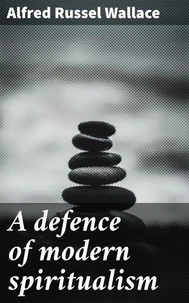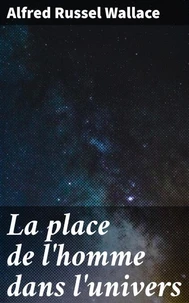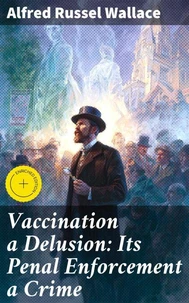The History of Malay Archipelago. Enriched edition. Exploring the Natural Wonders and Cultural Treasures of the Malay Archipelago
Par : ,Formats :
Disponible dans votre compte client Decitre ou Furet du Nord dès validation de votre commande. Le format ePub est :
- Compatible avec une lecture sur My Vivlio (smartphone, tablette, ordinateur)
- Compatible avec une lecture sur liseuses Vivlio
- Pour les liseuses autres que Vivlio, vous devez utiliser le logiciel Adobe Digital Edition. Non compatible avec la lecture sur les liseuses Kindle, Remarkable et Sony
 , qui est-ce ?
, qui est-ce ?Notre partenaire de plateforme de lecture numérique où vous retrouverez l'ensemble de vos ebooks gratuitement
Pour en savoir plus sur nos ebooks, consultez notre aide en ligne ici
- Nombre de pages542
- FormatePub
- ISBN859-65--4777781-6
- EAN8596547777816
- Date de parution14/12/2023
- Protection num.Digital Watermarking
- Taille2 Mo
- Infos supplémentairesepub
- ÉditeurGOOD PRESS
Résumé
In "The History of the Malay Archipelago, " Alfred Russel Wallace presents an illuminating exploration of the diverse ecosystems and cultures of Southeast Asia. Written in a meticulous, descriptive style that combines scientific observation with travel narrative, the book elucidates the region's rich biodiversity and the intricate interrelationships between species and their environments. Through detailed accounts of his travels, Wallace weaves a compelling narrative that serves not only as an ecological survey but also as a critique of contemporary natural history, situating his findings within the broader context of imperial exploration and scientific inquiry in the 19th century.
Alfred Russel Wallace, a naturalist and co-discoverer of the theory of evolution by natural selection alongside Charles Darwin, was profoundly influenced by his fieldwork in the Malay Archipelago. His extensive travels provided him with firsthand experiences of the region's unique flora and fauna, as well as its cultural complexities. Wallace's observations were instrumental in shaping his ideas on biodiversity and environmentalism, reflecting his commitment to understanding the natural world and its preservation.
This scholarly yet accessible work is highly recommended for anyone interested in natural history, ecology, or the historical intersections of science and colonialism. Wallace's vivid portrayals not only enrich our understanding of the Malay Archipelago but also challenge readers to consider the profound significance of biodiversity conservation today. In this enriched edition, we have carefully created added value for your reading experience: - A succinct Introduction situates the work's timeless appeal and themes. - The Synopsis outlines the central plot, highlighting key developments without spoiling critical twists. - A detailed Historical Context immerses you in the era's events and influences that shaped the writing. - An Author Biography reveals milestones in the author's life, illuminating the personal insights behind the text. - A thorough Analysis dissects symbols, motifs, and character arcs to unearth underlying meanings. - Reflection questions prompt you to engage personally with the work's messages, connecting them to modern life. - Hand-picked Memorable Quotes shine a spotlight on moments of literary brilliance. - Interactive footnotes clarify unusual references, historical allusions, and archaic phrases for an effortless, more informed read.
Alfred Russel Wallace, a naturalist and co-discoverer of the theory of evolution by natural selection alongside Charles Darwin, was profoundly influenced by his fieldwork in the Malay Archipelago. His extensive travels provided him with firsthand experiences of the region's unique flora and fauna, as well as its cultural complexities. Wallace's observations were instrumental in shaping his ideas on biodiversity and environmentalism, reflecting his commitment to understanding the natural world and its preservation.
This scholarly yet accessible work is highly recommended for anyone interested in natural history, ecology, or the historical intersections of science and colonialism. Wallace's vivid portrayals not only enrich our understanding of the Malay Archipelago but also challenge readers to consider the profound significance of biodiversity conservation today. In this enriched edition, we have carefully created added value for your reading experience: - A succinct Introduction situates the work's timeless appeal and themes. - The Synopsis outlines the central plot, highlighting key developments without spoiling critical twists. - A detailed Historical Context immerses you in the era's events and influences that shaped the writing. - An Author Biography reveals milestones in the author's life, illuminating the personal insights behind the text. - A thorough Analysis dissects symbols, motifs, and character arcs to unearth underlying meanings. - Reflection questions prompt you to engage personally with the work's messages, connecting them to modern life. - Hand-picked Memorable Quotes shine a spotlight on moments of literary brilliance. - Interactive footnotes clarify unusual references, historical allusions, and archaic phrases for an effortless, more informed read.
In "The History of the Malay Archipelago, " Alfred Russel Wallace presents an illuminating exploration of the diverse ecosystems and cultures of Southeast Asia. Written in a meticulous, descriptive style that combines scientific observation with travel narrative, the book elucidates the region's rich biodiversity and the intricate interrelationships between species and their environments. Through detailed accounts of his travels, Wallace weaves a compelling narrative that serves not only as an ecological survey but also as a critique of contemporary natural history, situating his findings within the broader context of imperial exploration and scientific inquiry in the 19th century.
Alfred Russel Wallace, a naturalist and co-discoverer of the theory of evolution by natural selection alongside Charles Darwin, was profoundly influenced by his fieldwork in the Malay Archipelago. His extensive travels provided him with firsthand experiences of the region's unique flora and fauna, as well as its cultural complexities. Wallace's observations were instrumental in shaping his ideas on biodiversity and environmentalism, reflecting his commitment to understanding the natural world and its preservation.
This scholarly yet accessible work is highly recommended for anyone interested in natural history, ecology, or the historical intersections of science and colonialism. Wallace's vivid portrayals not only enrich our understanding of the Malay Archipelago but also challenge readers to consider the profound significance of biodiversity conservation today. In this enriched edition, we have carefully created added value for your reading experience: - A succinct Introduction situates the work's timeless appeal and themes. - The Synopsis outlines the central plot, highlighting key developments without spoiling critical twists. - A detailed Historical Context immerses you in the era's events and influences that shaped the writing. - An Author Biography reveals milestones in the author's life, illuminating the personal insights behind the text. - A thorough Analysis dissects symbols, motifs, and character arcs to unearth underlying meanings. - Reflection questions prompt you to engage personally with the work's messages, connecting them to modern life. - Hand-picked Memorable Quotes shine a spotlight on moments of literary brilliance. - Interactive footnotes clarify unusual references, historical allusions, and archaic phrases for an effortless, more informed read.
Alfred Russel Wallace, a naturalist and co-discoverer of the theory of evolution by natural selection alongside Charles Darwin, was profoundly influenced by his fieldwork in the Malay Archipelago. His extensive travels provided him with firsthand experiences of the region's unique flora and fauna, as well as its cultural complexities. Wallace's observations were instrumental in shaping his ideas on biodiversity and environmentalism, reflecting his commitment to understanding the natural world and its preservation.
This scholarly yet accessible work is highly recommended for anyone interested in natural history, ecology, or the historical intersections of science and colonialism. Wallace's vivid portrayals not only enrich our understanding of the Malay Archipelago but also challenge readers to consider the profound significance of biodiversity conservation today. In this enriched edition, we have carefully created added value for your reading experience: - A succinct Introduction situates the work's timeless appeal and themes. - The Synopsis outlines the central plot, highlighting key developments without spoiling critical twists. - A detailed Historical Context immerses you in the era's events and influences that shaped the writing. - An Author Biography reveals milestones in the author's life, illuminating the personal insights behind the text. - A thorough Analysis dissects symbols, motifs, and character arcs to unearth underlying meanings. - Reflection questions prompt you to engage personally with the work's messages, connecting them to modern life. - Hand-picked Memorable Quotes shine a spotlight on moments of literary brilliance. - Interactive footnotes clarify unusual references, historical allusions, and archaic phrases for an effortless, more informed read.

